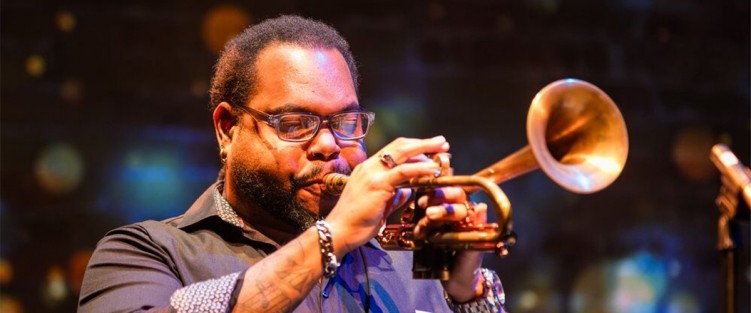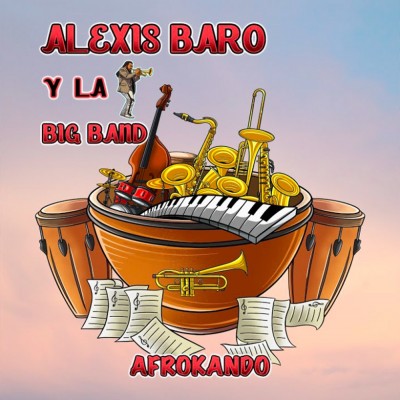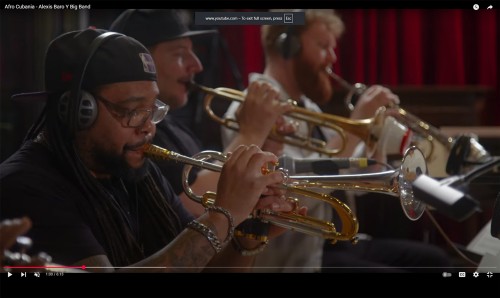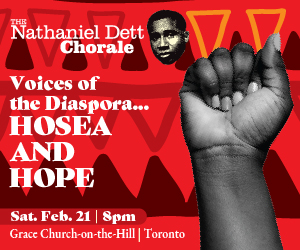 Afrokando, an ode to the Cuban big band, is a searing, scorching album with the deepest groove. With it, bandleader, composer, arranger and Cuban trumpet player Alexis Baro is continuing to build his discography, documenting and sharing important aspects of Afro-Cuban music. Baro travelled to Toronto from Cuba in 2001. The young player was quickly snapped up by Archie Alleyne and his group Kollage. Since then, Baro has written and recorded many of his own albums, all rooted in Afro-Cuban jazz.
Afrokando, an ode to the Cuban big band, is a searing, scorching album with the deepest groove. With it, bandleader, composer, arranger and Cuban trumpet player Alexis Baro is continuing to build his discography, documenting and sharing important aspects of Afro-Cuban music. Baro travelled to Toronto from Cuba in 2001. The young player was quickly snapped up by Archie Alleyne and his group Kollage. Since then, Baro has written and recorded many of his own albums, all rooted in Afro-Cuban jazz.
Scheduled for imminent release, Afrokando follows on the heels of Mi Raiz (My Roots) – an ode to the history of the Cuban trumpet. This latest album is deeply influenced by the greats, from Mario Bauzá and His Afro Cuban Jazz Orchestra to Perez Prado to Chudo Valdes. Says Baro, “this album has influences from all of those mentioned, and includes Chico O’Farrill, Hilario Duran, Picallo, Demetrio Muñiz, and Joaquín Betancourt, as well as Sami Nestico, Thad Jones and Bob Mintzer.” It is also, of course, influenced by the American big band musical canon from the orchestras of Count Basie, Duke Ellington and Glenn Miller whose influences Baro says are “within the sound of every big band, traditional or modern.”
The album features six of Baro’s original compositions and three by other composers. The sound is rich and bold, with Baro’s arrangements generously showing off the expertise of all the players. Underground Cha Cha Cha, which sounds like a grand film score for a thriller, is overlaid with solos by almost all the musicians. Bass clarinet and bass in unison? Now that’s a tasty sound I haven’t heard before, going on under the conga solo. In fact, the bass clarinet and its rich, growling texture is featured significantly throughout the album.
In the legendary format of the big band – bass, drums, piano, woodwinds and a plethora of horns – the album features a huge cast of Cuban and Canadian musicians. In the tradition of the Cuban big band, it also includes a wealth of percussion. It’s all very purposeful, this assemblage of musicians of different generations and cultures.
Paco Luviano on bass, Frank Martinez on drum kit and pianist extraordinaire Danae Olano hold it down almost throughout, with fiery keyboard polymath Jeremy Ledbetter playing piano on Paseo por el Prado. The 13 horn players include Allison Young, Luiz Deniz on sax, Alexander Brown on trumpet, and Yoel Bequer and Paul Tarussov on trombone. Baro also brings in Roberto Occhipinti on bass for the bolero, Tu Mi Delirio, and the cover, La Mawa, written by Pablosky Rosales, features Rudy Bolanos, who played bass on the original recording. Throughout, there is always a sense of looking back and looking forward, honouring the past, while living very much in the present day.
There is such a variety of Cuban genres and forms on the album. “The title track was in part inspired by Pello El Afrokán (Pedro Izquierdo Padron), a Cuban percussionist who created a rhythm called Mozambique, and in part by another Cuban rhythm called Pilon created by Enrique Bonne & Pacho Alonso,” says Baro. Afro Cubania is another very special arrangement, a history lesson almost, with its collage of Cuban music styles, tempos and Afro-Cuban grooves. Son a la Big Band is a song to swoon over. For some of the songs, like Tu mi Pelirio written by Puerto Rican singer Tito Rodríguez in the 1950s, and the loping, sensual Y Linda, Baro went with a more traditional sound. The latter tune features the powerful, almost sacred voice of the aptly named Angel Luis – with horns swirling respectfully around it.
Afrokando was recorded live off the floor, reflecting the recording process of the past. It is, however much brighter in texture and tone when compared to the albums by Antobal Cuban Allstars or Benny Moré Y Su Banda Gigante, recorded in the 1940s and ‘50s, in part due to the fact that Alexis Baro y la Big Band worked with engineer John “Beetle” Bailey, at Revolution Recordings – a state of the art studio where the likes of Rush and Elton John have recorded, and where they could include some overdubs for instrumental solos, and for percussion which was all played by one musician, Alberto Suarez.
“My musical vision was to revitalize and modernize the sounds of the Cuban big band without losing the essence of it. Cuban music has evolved since the big band golden years, so it is only logical and deserving that the legendary format gets a facelift, so newer generations can remember, admire and relate to their roots both musically and historically,” says Baro.
Afrokando is the next phase in the evolution of the big band. It’s brassy, bright, complicated and compelling. It’s both classic and exuberant, brilliant and tasty, with so much goodness. Sabroso!
Gloria Blizzard writes on music, dance, culture and is the author of Black Cake, Turtle Soup, and Other Dilemmas.





